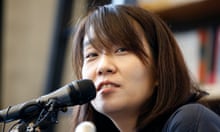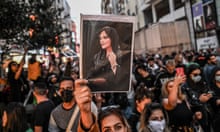The jailed Nobel peace prize laureate Narges Mohammadi has marked the first anniversary of her award with a call for peace in the Middle East from Tehran’s notorious Evin prison.
The Iranian human rights activist said in comments to Italy’s Corriere della Sera: “Today, the dark shadow of war once again hangs over our beloved country. I hate war.
“All those responsible for war are not only condemned by the people of the lands and times they devastate, but they are also for ever disgraced and ostracised in the annals of human history.”
The 52-year-old, whose prison conditions have significantly worsened since being awarded the prize, added: “These days, as I endure harsh security conditions, I wonder – does anyone hear our call for ‘No to war’?”
Mohammadi, who has been imprisoned since November 2021 for convictions in relation to her campaigning against capital punishment and the obligatory hijab in Iran, said on Wednesday that her treatment had become even more severe since she was awarded the prize on 6 October 2023.
This year’s prize will be announced by the Norwegian Nobel Committee on Friday. A total of 286 candidates – 197 individuals and 89 organisations – are known to be on the list of nominees, but their identities have not been revealed, in keeping with the committee’s standard practice.
Potential winners include the UN agency for Palestinian refugees (Unrwa), the international court of justice, which is tasked with resolving conflicts between countries in the courtroom rather than on the battlefield, and the Organisation for Security and Cooperation in Europe’s Office for Democratic Institutions and Human Rights.
Weeks after the 2023 ceremony in Oslo in December, where Mohammadi’s children collected the prize on her behalf, a revolutionary court in Iran sentenced her to an additional 15 months, accusing of spreading propaganda against the state while in prison.
“After receiving the Nobel Peace prize, I have been subjected to even tighter restrictions and harsher security conditions,” Mohammadi said. Soon after being awarded the prize, she added, she was “completely cut off from any communication with the outside world”.
Despite the repercussions, Mohammadi, a leading figure of the Woman, Life, Freedom movement, has remained dedicated to her activism.
“The people of Iran want life with dignity, and Islamic Republic is standing in the way of that,” she said. “The path forward for people of Iran is to transition from tyranny to democracy.”
When her father died earlier this year, she was not allowed to offer condolences to her family in Iran or attend his funeral. She continues to have her requests to speak with her children Kiana and Ali denied and her medical transfer have been “repeatedly cancelled and blocked by security and judicial authorities”.
She said: “Over the past month, despite a written order from a heart specialist for urgent angiography, I have been denied permission to leave the prison on three occasions, even after coordination with the hospital, prosecutor’s office, and prison authorities.”
She has also been denied physiotherapy for her back, despite severe pain caused by a herniated disc, and banned from receiving eye care.
“The government’s strategy seems to be one of delaying treatment until my health deteriorates completely,” she said.
The Woman, Life, Freedom movement has, she said, “not only visibly shaken the legitimacy of the regime but has also strengthened the foundations of democratic ideas, culture, traditions, and ways of life in society”.
This shift, she added, has “further ignited the hope of those fighting for democracy, freedom, and equality in this historical moment, though we still face a difficult path ahead”.
Earlier this year, her son Ali said the family would never stop fighting for Mohammadi’s freedom. Speaking from their home in Paris, he told the Guardian: “My mother is the first thing I think about when I wake up in the morning.”
His twin sister, Kiana, said: “It’s like a game [for the regime] where they hold all the cards in their hand. Every time my mum thinks she has a good card in her hand they can cheat and change the rules. It’s easy to win for them. We are all helpless in the face of this power.”










